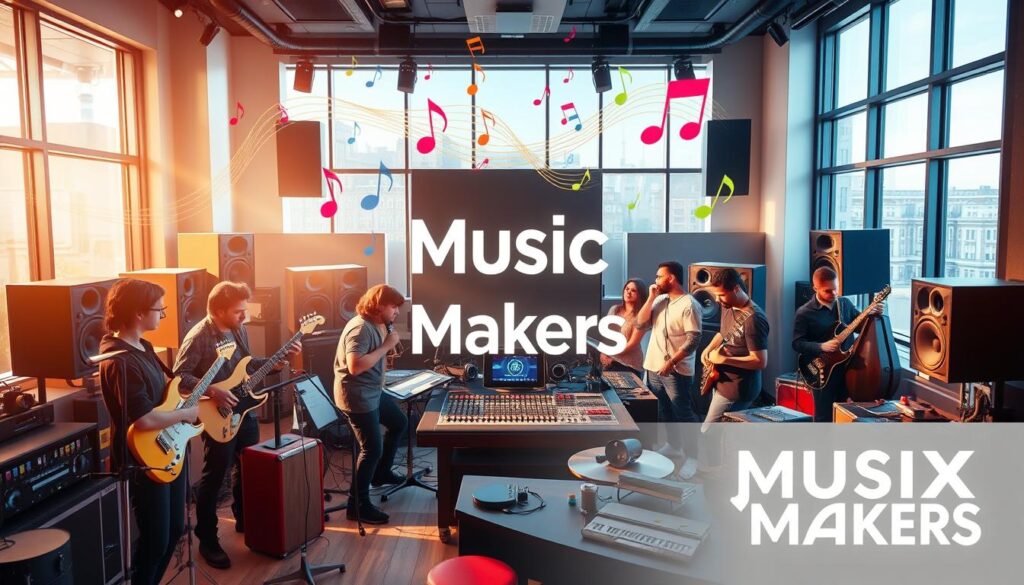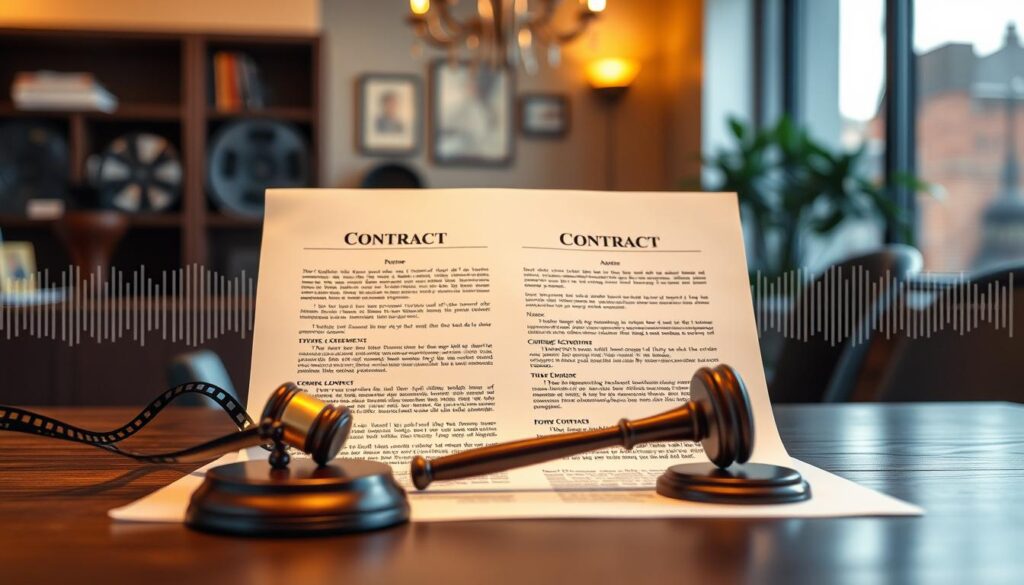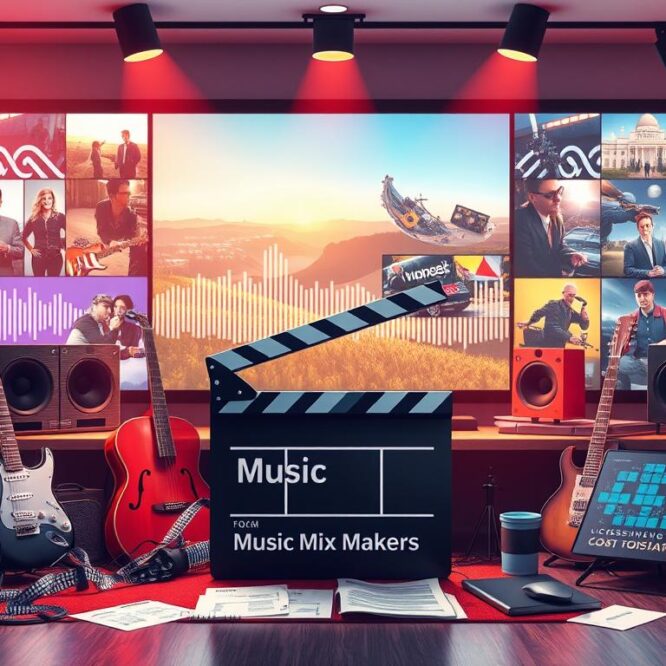As a seasoned professional in the industry, I’m thrilled to share my expertise on the intricate world of music licensing for films and TV. As the General Manager for Terrorbird Media, I represent over a dozen record labels and hundreds of independent artists for sync licensing, in addition to looking after the worldwide publishing rights for more than 150 songwriters. In this comprehensive guide, I’ll walk you through the key elements of a music license, the process of working with music supervisors, negotiating deals, and building a successful licensing business.
Whether you’re a musician looking to get your music placed or a content creator in need of the right soundtrack, this guide has you covered. From understanding the basics of copyrights and different types of music licenses to navigating the nuances of pitching your music and promoting your work through placements, I’ll provide you with the insights and strategies you need to succeed in the dynamic world of music licensing for films and TV.
Key Takeaways
- Learn the fundamentals of music licensing, including copyrights and different types of licenses
- Discover the key elements of a music license and how to negotiate deals
- Understand the role of music supervisors and how to effectively pitch your music
- Explore strategies for building a successful music licensing business
- Gain insights on promoting your music through placements in films and TV
Understanding Music Licensing
As a musician, navigating the complex world of music licensing can seem daunting, but it’s crucial to understand the basics. At the heart of music licensing are two distinct copyrights: the composition (the lyrics and melody) and the sound recording (the recorded version of the song).
Defining Copyrights: Compositions and Sound Recordings
When a TV show, film, or other media outlet wants to use your music, they need to obtain licenses for both the composition and the master recording, even if you own both. A master use license covers the right to use the sound recording, while a synchronization license covers the use of the underlying composition.
Understanding the difference between these two licenses is crucial when negotiating deals and ensuring you are fairly compensated for the use of your work.
“Knowing the difference between these two licenses is crucial when negotiating deals.”
By familiarizing yourself with the basics of music copyrights and the various types of licenses, you’ll be better equipped to navigate the world of music licensing and maximize the value of your creative work.
Key Elements of a Music License
When you license your music for use in films, TV shows, or other media, the agreement will typically include several crucial elements that determine the scope and terms of the license. As a music creator, understanding these key components is essential to ensuring your rights are protected and you receive fair compensation.
Media: Outlets and Platforms
The media rights section of the license specifies where your music can be used, such as in television programs, feature films, online videos, or advertising campaigns. Negotiating the appropriate media rights is crucial to prevent your music from being used in ways you didn’t intend or approve.
Term: Duration of the License
The term of the license refers to the duration for which the licensee can use your music. This can range from a single use to an indefinite, perpetual license. Carefully considering the term length is important to avoid your music being used for longer than you’re comfortable with.
Territory: Geographic Scope
The geographic territory outlined in the license determines where your music can be used. This could be a specific region, country, or global distribution. Knowing the territorial limitations is key to understanding the reach and potential exposure of your music.
Exclusivity: Restrictions on Other Uses
Exclusivity clauses in the license restrict your ability to license the same song to other projects during the term of the agreement. Understanding these limitations is crucial to managing your music catalog and ensuring you don’t inadvertently create conflicts.
Fee: Compensation for the License
The licensing fee, or the compensation you receive for the use of your music, is based on factors such as the media, term, and territory of the license. Carefully negotiating the fee is essential to ensure you are fairly compensated for the use of your creative work.
By thoroughly understanding these key elements of a music license, you can make informed decisions that protect your rights and maximize the value of your music in the film and television industry.
| License Element | Description |
|---|---|
| Media Rights | Outlets and platforms where your music can be used, such as TV, film, online, advertising |
| Term | Duration of the license, ranging from a single use to perpetual |
| Territory | Geographic scope where your music can be used, such as a specific region, country, or global |
| Exclusivity | Restrictions on licensing the same song to other projects during the term |
| Licensing Fee | Compensation you receive for the use of your music, based on factors like media, term, and territory |
Music Licensing for Films and TV
As a music creator, the world of film and television offers abundant opportunities to license your work. From blockbuster movies to hit TV shows, every production requires a carefully curated soundtrack that can make or break a scene. By licensing your music for use in these mediums, you can earn valuable royalties and gain exposure for your artistry.
Music licensing, also known as “sync licensing,” is the process of granting permission to use a musical composition or sound recording in a visual medium, such as a film, television show, or commercial. This lucrative sector of the music industry allows artists to monetize their creations beyond traditional music sales and streaming.
To successfully navigate the world of music licensing for film and TV, it’s crucial to understand the key elements involved, including:
- Media – The specific outlets and platforms where your music may be used, such as theatrical releases, TV broadcasts, or digital streaming platforms.
- Term – The duration of the license, which can range from a one-time use to a long-term, renewable agreement.
- Territory – The geographic scope of the license, which can be limited to a specific region or span the globe.
- Exclusivity – The level of restriction placed on the use of your music, whether it’s exclusive to a single production or open to multiple uses.
- Fee – The compensation you receive for granting the license, which can vary widely depending on factors like the scale of the project and the prominence of your music in the final product.
By understanding these key elements and negotiating favorable terms, music creators can unlock the immense potential of the film and television industry, earning royalties and gaining valuable exposure for their work.
“Music can make or break a scene, so producers and music supervisors are constantly on the hunt for the perfect tracks to complement the visuals.”
Pitching Your Music: DIY vs. Representation
When it comes to getting your music licensed for films, TV, and other media, you have two main options: going the DIY route or working with a professional licensing agent or music publisher. Both approaches have their advantages and drawbacks, so it’s essential to understand the differences before deciding which path to take.
Going It Alone: Building Relationships and Networking
Pursuing sync placements on your own requires a significant investment of time and effort. You’ll need to build relationships with music supervisors, learn the intricacies of the sync licensing industry, and navigate the pitching process independently. This can be a time-consuming and challenging task, but it gives you more control over the process and a larger share of the royalties.
To succeed with DIY music licensing, focus on networking for sync placements and pitching music for sync licensing. Attend industry events, participate in online communities, and reach out directly to music supervisors to introduce your work and build connections. Develop a strategic approach to DIY music licensing, and be prepared to put in the legwork to secure these valuable placements.
Enlisting Professional Representation
Alternatively, you can enlist the help of a licensing agent or music publisher to handle the pitching process on your behalf. While you’ll have to share a portion of the royalties, this approach can open doors and streamline the process of pitching music for sync licensing. These professionals have established relationships with music supervisors and a deep understanding of the industry, which can significantly increase your chances of securing placements.
When working with a licensing representative, be sure to carefully review the terms of the agreement and understand the division of royalties. This can be a valuable partnership, but it’s important to ensure that it aligns with your long-term goals and financial interests.

Ultimately, the decision between DIY music licensing and working with a professional representative comes down to your personal preferences, resources, and goals. By weighing the pros and cons of each approach, you can make an informed decision that best suits your needs and increases your chances of success in the competitive world of sync placements.
Working with Music Supervisors
As a music creator, understanding the role and needs of music supervisors is crucial for securing placements in films, TV shows, and other media. These gatekeepers are responsible for finding the perfect musical cues that seamlessly fit the mood, tone, and style of a project, while also staying within a limited budget and timeline.
Understand Their Responsibilities
Music supervisors wear many hats. They must balance the desires of producers, directors, and clients with the needs and wants of artists, labels, and publishers. Their primary responsibilities include:
- Researching and curating music that enhances the visual narrative
- Clearing the necessary licenses for the selected music
- Negotiating the terms and fees for the music licenses
- Ensuring the music is properly integrated into the final production
Understand Their Needs
To increase your chances of working with music supervisors, it’s essential to understand their specific needs and preferences. Music supervisors are often looking for:
- Tracks that perfectly fit the mood, tone, and style of the project
- Music that stays within a limited budget and production timeline
- Recordings with clear, high-quality audio and no audible issues
- Artists and composers who are responsive, professional, and easy to work with
By aligning your music and approach with the needs of music supervisors, you can position yourself for successful collaborations and placements in the world of film, TV, and media.
“Music supervisors are the gatekeepers of the industry, responsible for finding the perfect musical cues that enhance the visual narrative. Understanding their role and needs is crucial for securing placements in films and TV.”
Negotiating License Deals
When a production company or brand expresses interest in licensing your music, it’s time to negotiate the terms of the deal. This process involves evaluating several key factors, such as the intended media usage, geographic territory, duration of the license, and the compensation offered. Navigating these negotiations effectively can help you secure the best possible agreement for your work.
Evaluating Offers and Getting It in Writing
As you review a licensing offer, it’s crucial to carefully consider the details. Start by assessing the intended media usage – will your music be used in a film, TV show, advertisement, or another medium? The geographic territory covered by the license is also important, as this determines where your music can be used. Additionally, pay close attention to the duration of the license, which may range from a few months to several years.
Another key factor to evaluate is the exclusivity of the deal. Some licenses may restrict your ability to license the same song to other parties, while others may allow for non-exclusive use. Finally, be sure to thoroughly understand the compensation being offered, as this will directly impact the value of the deal.
Once you’ve evaluated all the details and reached an agreement, it’s essential to get the terms in writing. A well-crafted contract will help ensure that all parties are on the same page and protect your rights as the music creator. While some flexibility is expected during negotiations, advocating for the best possible deal can help you maximize the value of your music licensing opportunities.

“Negotiating a music licensing deal is all about finding the right balance between your creative and financial interests. With careful evaluation and clear communication, you can secure an agreement that works for both you and the client.”
Building a Successful Licensing Business
If you’re passionate about music and eager to turn your talents into a thriving career, building a successful licensing business should be your top priority. By treating music licensing as a core part of your business model, rather than a side hustle, you can create a sustainable and lucrative path forward.
The key to building a music licensing business lies in continuously creating and curating a catalog of high-quality, sync-friendly tracks. This means producing music that is versatile, emotive, and perfectly suited for use in films, TV shows, and other media. Additionally, you’ll need to focus on growing your music licensing portfolio by actively pitching your work to industry gatekeepers, such as music supervisors and licensing agents.
Navigating the complexities of the music licensing landscape can be daunting, but with the right strategies and a commitment to learning, you can position yourself for success. Diversifying your income streams and focusing on placements can help you turn your passion for music into a thriving licensing business.
- Continuously create and curate a catalog of high-quality, sync-friendly tracks
- Build relationships with industry gatekeepers, such as music supervisors and licensing agents
- Learn to navigate the complexities of the music licensing landscape
- Diversify your income streams and focus on placements
| Strategy | Benefits |
|---|---|
| Focusing on Placements | Generates recurring revenue and raises your profile in the industry |
| Diversifying Income Streams | Reduces financial risk and provides a more stable and predictable income |
By embracing these successful sync licensing strategies, you can transform your passion for music into a thriving and sustainable licensing business. With dedication, creativity, and a deep understanding of the industry, you can build a music licensing portfolio that sets you up for long-term success.
“The key to building a successful music licensing business is to treat it as a core part of your overall business model, not just a side hustle.”
Promoting Your Music Through Placements
As an independent artist, securing music placements in films, TV shows, advertisements, and other media can be a game-changer for your career. Not only do these sync licensing deals provide valuable financial rewards, but they also offer unparalleled promotional opportunities to reach new audiences and grow your fanbase.
When your music is featured in a popular TV series or a viral online ad, it has the potential to drive streams, downloads, and concert ticket sales. Each placement introduces your work to listeners who may have never encountered it before, sparking their interest and curiosity. By leveraging these sync opportunities, you can effectively promote your music through sync placements, leverage sync licensing for exposure, and use licensing to grow your fanbase.
Building relationships with music supervisors, producers, and other industry gatekeepers is crucial to securing these coveted placements. Networking, consistently pitching your music, and understanding the specific needs and preferences of these key decision-makers can significantly increase your chances of landing a sync deal.
| Benefit | Description |
|---|---|
| Financial Rewards | Sync licensing deals can provide a steady stream of revenue, which can be reinvested into your music career. |
| Promotional Exposure | Each placement introduces your music to new audiences, potentially driving increased streams, downloads, and concert ticket sales. |
| Fanbase Growth | Successful sync placements can help you build a loyal following and expand your reach as an artist. |
Harnessing the power of sync licensing is a strategic way for independent artists to promote their music, gain exposure, and grow their fanbase. By proactively pursuing these opportunities and building strong industry connections, you can unlock new avenues for success in the ever-evolving music industry.
“Having your music featured in a hit TV show or blockbuster film can be a career-defining moment for an independent artist. It’s a powerful way to reach new audiences and showcase your talent to the world.”
Conclusion
In this comprehensive guide, I’ve explored the essential elements of music licensing for films and TV. From understanding the intricacies of copyrights and the different types of licenses to mastering the art of negotiating deals with music supervisors, I’ve aimed to equip you with the knowledge and strategies needed to turn your passion for music into a thriving, sustainable licensing business.
Whether you’re a musician seeking to monetize your work or a content creator searching for the perfect soundtrack, the world of sync licensing holds immense potential. By building meaningful relationships, curating a sync-friendly catalog, and effectively leveraging your placements for promotional purposes, you can unlock a world of opportunities and position your music for success on the big and small screens.
As you move forward on your music licensing journey, remember the key takeaways: stay informed about the evolving industry landscape, cultivate strong connections with industry professionals, and consistently create high-quality, sync-ready tracks. With dedication and a strategic mindset, the path to securing lucrative music placements and expanding your reach as an artist or composer is within your grasp. The next steps are yours to take – embrace the power of music licensing and let your creativity shine on the global stage.
